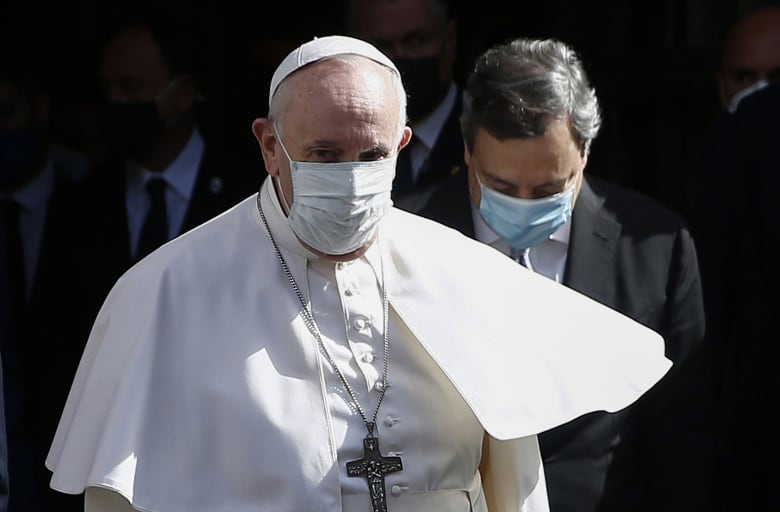Canadian bishop hopes residential school apology marks 'step of healing'
Bishop William McGrattan says Pope should hear from survivors directly to understand need for papal apology

A Calgary bishop says he hopes the apology the Canadian Conference of Catholic Bishops made earlier this week for its church's involvement in residential schools marks "a step of healing" toward reconciliation with survivors and their families.
The organization released a statement on Friday after its annual meeting in plenary of bishops across the country, an occasion the group often uses to discuss what issues are top of mind for the clergy of the Catholic Church, Bishop William McGrattan said on Sunday.
"It was unanimous. It was a unifying understanding that we, as the Catholic bishops coming together, wanted to make this statement as a step of healing — one of beginning, hopefully, a new path of hope," said McGrattan, who's also vice-president of the bishops' organization.
"And it's a sign, I hope … of our recognition of the pain and the suffering the residential schools have caused and our participation as a church."
McGrattan said individual dioceses across Canada had already made similar statements but this was the first time an apology came from bishops nationwide.
The apology was met with mixed feelings from Indigenous organizations and survivors of residential schools.
Gerry Shingoose, a survivor living in Winnipeg, said she didn't find the apology sincere since the Catholic Church still hasn't been meaningfully held accountable for its role in the institutions.
A day earlier, Assembly of First Nations National Chief RoseAnne Archibald said she welcomed the apology but was disappointed it didn't invite the Pope to Canada to offer an apology of his own.
It's a call to action that was highlighted in the Truth and Reconciliation Commission's final report in 2015.
"I understand that some might think that it's late and maybe not sufficient," McGrattan said.
"But we just hope in goodwill that it will be received and we can begin … to mend and to restore those relationships."
Calls for apology from Pope
McGrattan said the bishops are open to the possibility of discussing an apology with Pope Francis.
He said Canadian bishops worked with a delegation of residential school survivors, Indigenous youth and knowledge keepers in writing their apology this week.
Now, he thinks the Pope should hear from those people directly.

That way, "he can hear firsthand and understand that pain and [how far an] apology here in Canada would go to help what we are trying to do with our apology," he said.
McGrattan said the bishops are committed to continuing to educate themselves on the history and legacy of residential schools and how their own church was involved.
"The understanding of this history is important. And maybe we have not necessarily really understood the voice of [Indigenous people]," he said.
Sharing church records
The bishops are also committed to sharing church records with communities looking to identify and memorialize children who died while being forced to attend residential schools, McGrattan said.
It's a process he said he's already begun with two First Nations in the Calgary area.
"It was important for me to go to these communities and to immediately share with them what we have so that they understood," he said.
"Then with that knowledge, then we can work together. And I think that's the first step…. I hope that others will take that leadership and that response as well."
For the first National Day for Truth and Reconciliation coming up on Sept. 30, McGrattan said pastoral ministers, clergy and deacons in his diocese in Calgary have decided to take part of the day off work to do a webinar and learn more about the church's involvement in residential schools.
He said he hopes his church's faithful will take steps to educate themselves, too.
"And by doing that, we first have to listen," he said.
"When we listen, I think we are more empathic and more understanding of what people have suffered."